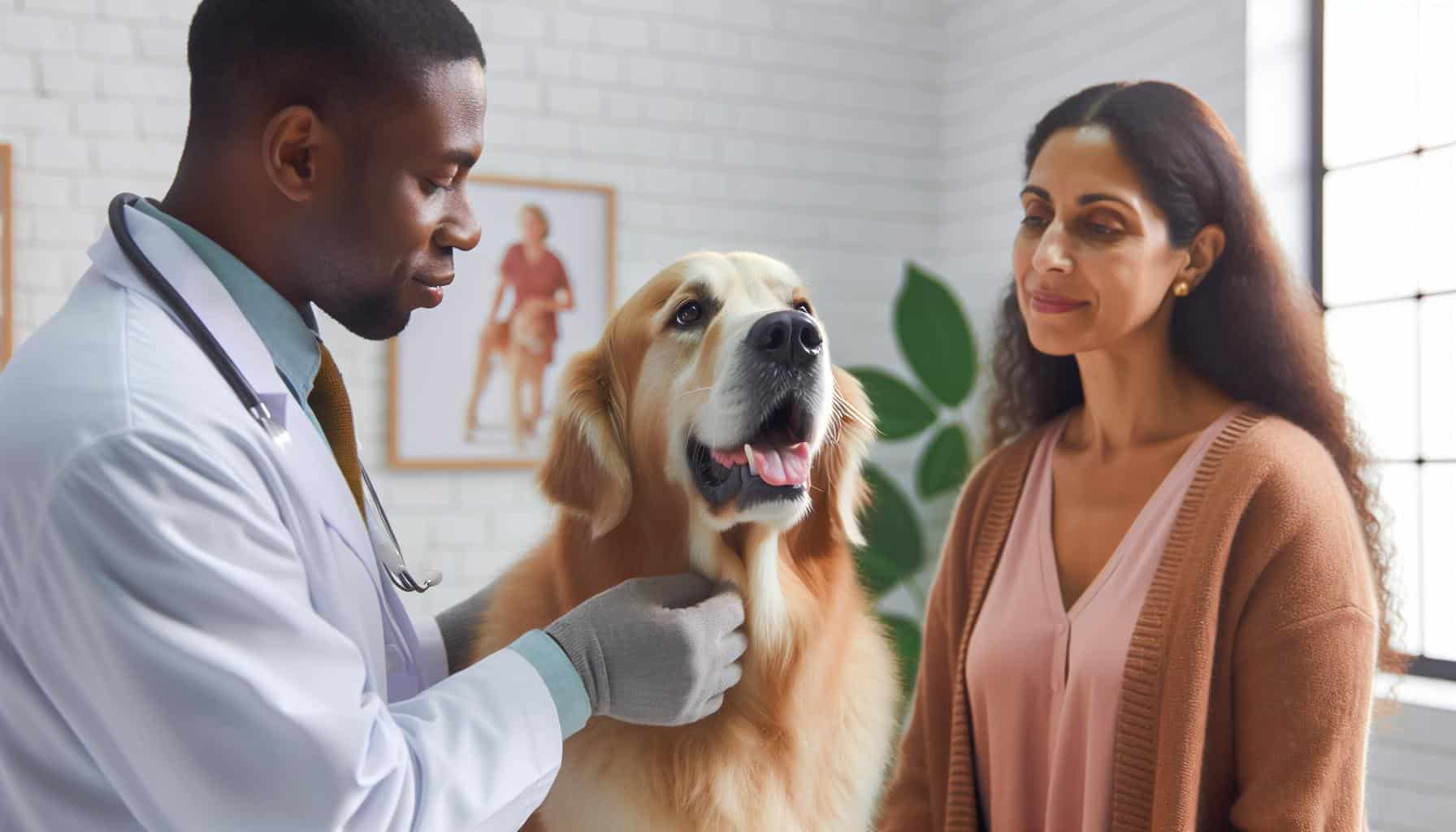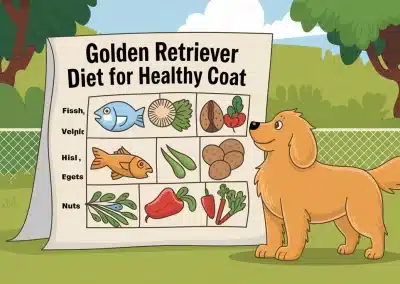Cutting Cancer Risks in Goldens. Golden Retrievers are the epitome of loyalty and affection, making them one of the most beloved dog breeds. Yet, it’s disheartening to learn that these furry friends are more prone to cancer than other breeds. This revelation raises a crucial question: Why do Golden Retrievers get cancer more often?
The answer isn’t straightforward. It involves a blend of genetics, environmental factors, and breed characteristics that contribute to their higher cancer risk. As we delve into this topic, we’ll explore the multifaceted reasons behind this concerning trend and what can be done to mitigate it.
Genetics and Cancer Risk
When I started looking into why Golden Retrievers might be more susceptible to cancer than other breeds, genetics stood out as a primary factor. The connection between genetics and cancer risk isn’t straightforward, but it’s clear that certain inherited traits significantly impact their likelihood of developing the disease.
Specific Genes and Cancer
Golden Retrievers have been found to carry specific genes that make them more prone to developing cancers such as lymphoma, mast cell tumors, osteosarcoma, and hemangiosarcoma. Research indicates that genes including BRCA1 and BRCA2, more commonly associated with breast and ovarian cancer in humans, also play a role in canine cancers. These genetic factors certainly contribute to the higher incidence of cancer observed in the breed.
Age and Genetics Intertwined
Furthermore, the effect of these genetic predispositions becomes more pronounced as Golden Retrievers age. As they reach their senior years, the likelihood of cancer skyrockets due to the accumulation of DNA damage over time. It’s a combination of their genetic makeup and the natural aging process that puts them at a heightened risk.
Taking Preventative Measures
Understanding the genetic aspect of cancer in Golden Retrievers allows pet owners to take more informed steps towards prevention and early detection. Regular veterinary check-ups and specific screenings for cancer can be vital in catching any signs of the disease early on. Knowledge of their dog’s heightened risk can encourage owners to pursue a healthier lifestyle for their pets, potentially mitigating some of the genetic risks.
In piecing together the puzzle of why Golden Retrievers are more likely to get cancer, it’s crucial not to overlook the role of genetics. While we can’t change their DNA, being aware of the risks and taking actionable steps towards prevention can make a significant difference in their overall health and longevity.
Environmental Factors and Cancer

When I started digging into why Golden Retrievers seem to get cancer more frequently than other breeds, one critical aspect stood out: environmental factors. It’s not just genetics at play here; the world around these dogs can significantly impact their health.
The Role of Carcinogens
First and foremost, let’s talk about carcinogens. These are substances capable of causing cancer in living tissue. For our furry friends, these can come from tobacco smoke, household chemicals, and even pesticides. Imagine a Golden Retriever, with its playful and curious nature, romping around a yard that’s been recently treated with chemicals. It’s uneasy to think about, but it’s a common scenario that could contribute to their higher cancer risk.
The Impact of Pollution
Furthermore, living in areas with high levels of air pollution or contaminated water sources can also elevate the risk. Airborne pollutants and toxic chemicals in water can be ingested or inhaled, accumulating in the body over time. Since Golden Retrievers often live as beloved family pets, their exposure mirrors human exposure within the same environment.
Lifestyle Factors
Beyond the invisible threats, lifestyle factors also play a role. Obesity, for example, is a known risk enhancer for many diseases, including cancer. A sedentary lifestyle or a diet high in processed foods can contribute to unhealthy weight gain in dogs. Daily exercise and a balanced diet are not just good for keeping your Golden Retriever trim; they can also reduce the risk of cancer.
While it might seem daunting, recognizing these environmental factors gives us power. As a pet owner, I’ve learned that making small changes, like using natural cleaning products or providing a diet rich in antioxidants, can make a big difference. Ensuring plenty of exercise and playtime in safe, clean environments can also limit exposure to harmful carcinogens.
Breed Characteristics and Cancer Predisposition
Delving into the heart of why Golden Retrievers are more susceptible to cancer than other breeds, it’s crucial to understand their unique breed characteristics and genetic makeup. These insights not only shed light on their predispositions but also guide us on preventive measures.
Genetic Blueprint
First off, the genetic architecture of Golden Retrievers plays a significant role in their heightened cancer risk. Research suggests that certain genes in Goldens are predisposed to mutating in a way that leads to cancer. This isn’t about one single gene, but rather a combination that affects their immune system and its ability to fight off cancer cells.
Breed-Specific Risks
Narrowing down, Golden Retrievers are particularly prone to specific types of cancer such as lymphoma, mast cell tumors, osteosarcoma, and hemangiosarcoma. Each of these cancers has its unique triggers and pathways, but unfortunately, they find a common ground in this beloved breed. Understanding these types makes early detection and tailored interventions possible.
Size and Lifespan Correlation
Interestingly, the size and lifespan of Golden Retrievers also contribute to their cancer risk. Larger breeds tend to have a higher incidence of cancer, and Goldens, being a relatively large breed, are no exception. Moreover, their typical lifespan provides a longer window for cancer to develop, especially compared to smaller breeds that may not live as long.
Steps Toward Prevention
Knowing these breed-specific risks and genetic predispositions empowers us to take proactive steps. Regular check-ups, tailored nutrition, ample exercise, and maintaining a healthy weight can significantly lower their chances of developing cancer. Moreover, early screening for the most common cancers in Golden Retrievers can lead to early detection, which is crucial for effective management and treatment.
While genetics and breed characteristics heavily influence the increased cancer rates in Golden Retrievers, understanding these factors allows pet owners to create a nurturing environment. By focusing on prevention and early detection, we can hope to improve the quality of life and longevity for these loving and loyal companions.
Mitigating the Cancer Risk in Golden Retrievers
No doubt, being a Golden Retriever owner has brought me loads of joy. Yet, the concern around their higher cancer risk lurks in the back of my mind. I’ve learned it’s not just about loving them but also proactively safeguarding their health. Here’s what I’ve gathered on how to mitigate these risks.
Early Screening and Regular Check-ups
Firstly, early detection is crucial. I make sure my Golden gets a comprehensive health screening at least once a year. Vets often focus on early signs of common health issues, including cancer. These screenings can catch problems long before symptoms show up, offering a better chance at successful treatment.
Tailored Nutrition
Their diet plays a massive role. I’ve switched to a high-quality, balanced diet that supports immune health and reduces inflammation. Foods rich in antioxidants – like blueberries, spinach, and carrots – have become regulars in their meals. I also avoid foods with artificial additives or known carcinogens.
Exercise and Weight Management
I keep my Golden active. Regular exercise ensures they maintain a healthy weight, reducing the strain on their heart and decreasing cancer risks. It’s not just about the quantity but also the quality of exercise. We mix it up with walks, fetch, and swimming – their absolute favorite.
Limiting Exposure to Carcinogens
Aware of the link between certain environmental factors and cancer, I’ve taken steps to minimize exposure. This means using natural cleaning products and being mindful of pesticides in our outdoor spaces. Also, I avoid exposing my dog to secondhand smoke or areas with heavy air pollution whenever possible.
By implementing these strategies, I feel empowered knowing I’m doing my part in fighting the odds. It also enriches the bond I share with my Golden, as each action underscores the care and commitment I have toward their well-being.
Conclusion
I’ve always believed that knowledge is power, especially when it comes to the health of our furry friends. Understanding why Golden Retrievers are more susceptible to cancer is the first step in a journey toward better care and prevention. Armed with the right strategies, like regular vet visits, a balanced diet, and plenty of exercises, we can make a real difference in their lives. It’s all about giving them the best chance at a long, happy life by our sides. Let’s not forget, every moment with them is precious, and by taking proactive steps, we’re not just prolonging their lives, we’re enriching them.









